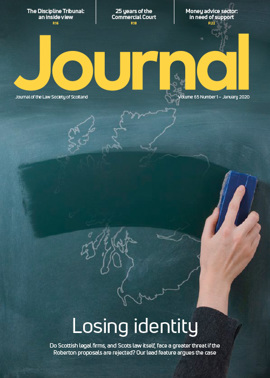Promoting public health: a way forward?

The last article considered the “promoting and improving public health” licensing objective and the problems faced by licensing boards when dealing with it in practice. Since then, I have had the opportunity to consider the evidence given to the Local Government & Communities Committee in September of last year, which highlighted the approach being taken by Glasgow Licensing Board. This seems to be a unique approach, and, music to the ears of any clerk, one which involves no expense to the board itself.
It involves a partnership approach between the Glasgow board on the one hand and the Glasgow City and Renfrewshire Alcohol and Drug Partnerships (ADPs) on the other. For quite some time in Glasgow, objections were lodged by health boards to almost all applications. These were usually generic in nature, which meant that it was often difficult to attach weight to these and to relate the objection to the specifics of the application. The ADPs felt that licensing should be an important part of their remit. Accordingly, a couple of years or so ago, they created a post, Health Improvement Lead Alcohol Licensing, to deal specifically with licensing issues.
Evidential basis
Elaina Smith is the second holder. Both she and Mairi Millar, clerk to the Glasgow board, gave evidence to the committee. Having highlighted the problems of the generic, one-objection-fits-all approach referred to above, Millar pointed out that the availability of targeted, direct and localised information is the key to making use of the public health licensing objective.
In her evidence, Smith told the committee that her post is unique in Scotland. She explained that her approach to an individual licensing application depends on information held about alcohol-related harm in an area, and the triage process which is followed.
Fortunately, like me, the convener didn’t understand what triage meant and asked for further information. (The Oxford English Dictionary defines it as “the action of assorting [sic] according to quality”.) Smith pointed out that at one time she would receive only a standard letter with relatively little information about the application. Now she receives a copy of the application and the operating plan, which enables her to see exactly what the licensing team sees. Her next step is to look at the area where the premises are located and at the statistics on alcohol-related harm. This of course is entirely consistent with part 9 of the Glasgow board’s policy. That makes it clear that when considering an application for off sales primarily directed to persons in the locality, where there is evidence that the locality in which the applicant premises is situated suffers from higher than the national average levels of alcohol-related health harms, the board will give careful consideration to the health objective.
Smith further explained that four sets of figures are considered. These are alcohol-related hospital stays; alcohol-related deaths; alcohol-related brain damage admissions; and mental health discharges related to alcohol. If these indicators are in the top 25% of the worst areas, she will investigate further. Millar’s evidence concluded with her stating that Elaina Smith’s role in providing the evidential basis that is needed to deal with individual applications in such a way that the public health licensing objective can properly be promoted “cannot be overestimated”.
Practical approach
This is an interesting experiment. The crux of it is that two ADPs felt that it was of sufficient importance to create and fund the post, and to lend the services to the local licensing board. It will be interesting to see if the experiment spreads. One stakeholder commented to me that if the holder of the post is good then the role potentially serves a useful purpose. This was, however, followed by a warning – if the person is simply a propagandist for the health lobby then the role serves no purpose at all.
One thing seems certain. With boards across the country complaining that they can’t get hold of sufficient data to allow them to make decisions, or being criticised in courts for proceeding with insufficient evidence, this is an imaginative and practical step forward.







